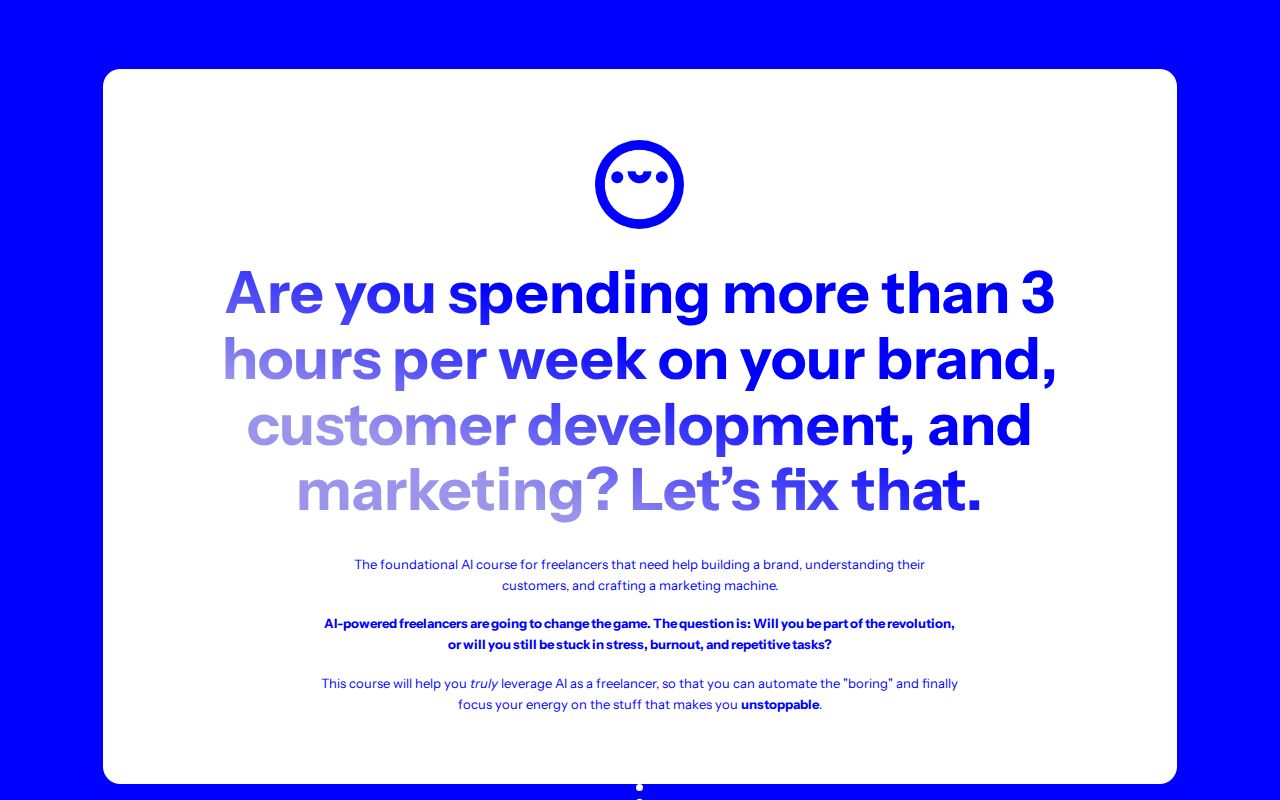Freelancing is… a bizarre paradox. You’re the boss, but also the underpaid intern. The strategic thinker, but also the one stress-Googling "how to write a good invoice."
We set the deadlines, the rates, the expectations, and then proceed to sabotage ourselves with the worst management techniques imaginable.
And two of the biggest culprits? The words "always" and "never".
(Sidenote: How crazy is it that language a) can impact how our neurons form and b) exists at all? I make a sound or draw a shape and you know what that it means the letter “a”? Shook.)
The freelancer mindset trap
Your brain loves telling stories, but it’s got the fact-checking skills of a tabloid.
Say "I’ll never land high-paying clients"enough times, and your brain just assumes you’re right. No investigation. No cross-referencing.
If you say "I’ll never land high-paying clients" enough times, your brain stops looking for evidence to the contrary. It assumes you are right, even when you’re not.
This hit me hard at some point. I caught myself thinking, "Dammit, I always seem so dumb and over-eager in discovery calls with clients." (Cue dramatic sigh.)
When I actually looked back, I realised that the more I prepared, the less anxious I felt in discovery calls. And the more positive I felt about the call afterwards. I also noticed that the more excited I was about the project itself, the less I felt like I evolved into a walking pimple during the call.
If you decide to stop reading at this point, here’s your takeaway:
The moment I stopped using absolutes, I saw patterns. The “meh” discovery calls generally came from unprepared or unexcited Jomiro. The difference wasn’t luck. It was my process.
How absolutist thinking sabotages your success
Pricing & negotiation
Saying "Clients never pay what I’m worth." makes it easier to believe that pricing is out of your hands. Some clients genuinely won’t pay high rates, but many will if you position yourself well. Market conditions matter, but so does how you present your value.
Instead, "Some clients don’t, but many do. I need to find them." Now you’re thinking in solutions, not roadblocks.
🔥 I used to believe "I’ll never be able to charge more than €X for a logo." Then one day, a client did pay more. The problem wasn’t them. It was me, not asking for it. Awkward, but also life-changing.
Skill & imposter syndrome
"I always mess up client calls." convinces you that you’re bad at communication.
Instead, "I sometimes struggle, but I can improve with practice." That leaves space to grow.
🫠 A real moment of clarity: "I always sound like an idiot in discovery calls." Turns out, not true. Sometimes I’m a mess, sometimes I’m great. The difference? Preparation.
One time, I walked into a call completely unprepared, fumbled through my own services like I had never heard of them before, and thought, "Wow, I am terrible at this." The next time, I wrote bullet points, anticipated questions, and boom—the client signed on the spot. It wasn’t about me, it was about preparation.
Project rejections
Saying "I’ll never land a dream client." makes you stop trying.
Instead, "I haven’t yet, but I often get better at outreach with each attempt." See the shift?
🤡 The first time I pitched a client I really wanted, I sent an email so awkwardly formal, they probably thought I was AI-generated. Instead of deciding "I’ll never be good at this", I refined my pitch. Clients started saying yes.
Rejection isn’t a sign you’re bad at freelancing. It’s a sign you’re doing it right. The people who never get rejected? They aren’t taking any shots. The more you cringe at your old work, the more you’re evolving.
The Fix: Rewrite your script
Every time you catch yourself thinking never or always, pause. Flip the script.
"I never get referrals." → "I haven’t yet asked my past clients for referrals. Maybe I should start?"
"I always get bad clients." → "Some clients aren’t a fit, but I can refine my onboarding to attract better ones."
"Freelancing is always unstable." → "There are ups and downs, but I can build systems to make income more predictable."
Most freelancers don’t fail because they’re bad at their work. They fail because they reinforce the wrong narratives. The more you do this, the more freelancing stops feeling like a chaotic, unpredictable nightmare. It starts feeling like something you can actually control.
Cool, so now what?
Here’s a challenge: For the next week, catch yourself whenever you think always or never about freelancing. Write it down. Challenge it. Reframe it.
You’re not in a dead-end. You’re in a plot twist. And the best part? You get to write the next scene. You’re just in the middle of figuring things out. And that’s exactly where you need to be. 🚀

